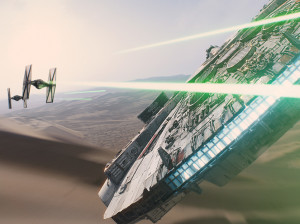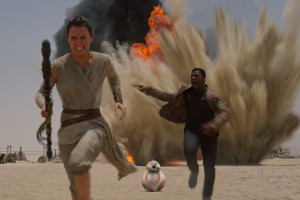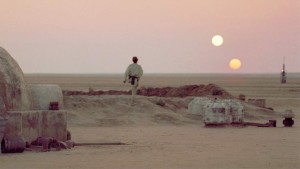FAIR WARNING: Spoilers abound regarding Star Wars: Episode VII – The Force Awakens in the space below.
 Unlike most of my friends — many of whom were in theaters the second Disney released the movie access codes on opening night — I waited eleven days after the movie’s launch to go see it. The reason: I’d promised my sci-fi loving mother-in-law I’d take her when my wife and I traveled that way over the holidays. True to my word, I waited patiently so she and I (and my grade school-aged daughter) could see it for the first time together. In that comparatively short eleven day period, the movie grossed over $1 billion dollars, garnered a ton of positive press, and was good enough that I had friends telling me to go see it so they could talk with me about it already!
Unlike most of my friends — many of whom were in theaters the second Disney released the movie access codes on opening night — I waited eleven days after the movie’s launch to go see it. The reason: I’d promised my sci-fi loving mother-in-law I’d take her when my wife and I traveled that way over the holidays. True to my word, I waited patiently so she and I (and my grade school-aged daughter) could see it for the first time together. In that comparatively short eleven day period, the movie grossed over $1 billion dollars, garnered a ton of positive press, and was good enough that I had friends telling me to go see it so they could talk with me about it already!
Even without all of the above, Episode VII is arguably the most-hyped film in the history of modern cinema. Suffice to say, then, that I walked into the theater to see the film under the most crushing of expectations. (Other than an in-law divulging Luke’s disappearance — which is, of course, revealed in the opening crawl — I managed to make it to showtime knowing nothing other than what was revealed in the official trailers.) Two-plus hours later, I walked out of the theater having finally experienced the source of the hype.
As we departed, my mother-in-law asked me what I thought. My answer was something to the effect of, “pretty solid,” but even as I said it I wasn’t sure I believed it. In fact, the more I thought about it, the more confused I was about what I thought about it. That the movie was better than Episodes I or II was self-evident. (Low bar.) But I struggled to place the movie in the rest of the franchise. Parts of the movie seemed amazing, while others seemed puzzling at best, problematic at worst. Eventually, after perusing the internet’s copious supply of post-movie analysis, I reached one, inescapable conclusion.
I can’t give the film a grade, or a ranking. Not yet.
Why?
First and foremost, Episode VII leaves more loose ends than any other Star Wars film I can think of. Now, to a certain degree, every Star Wars film has a couple of unresolved plot points, from Episode I sending Anakin off to an uncertain Jedi future, to Episode VI leaving uncertain the future of the post-Empire galaxy. I think most people would agree that Episode V, The Empire Strikes Back, offered the most of the first six films: Han is frozen in carbonite, Luke is left trying to make sense of Vader as his father, and Yoda has yet to explain what is meant when he told Obi-Wan that “there is another,” along with a few other smaller details.
 Yet I think Episode VII easily eclipses Episode V when it comes to loose ends. Start with the two principals: Finn and Rey. After two hours, we know that Finn is a former stormtrooper and Rey is a former scavenger with Force abilities … and not a whole lot else. (This is scarcely more than we knew after we watched the trailers!) Who is Finn’s family? No idea. Who are Rey’s parents? Not a clue, although half the internet has an opinion on that one. We don’t know Finn’s real name, if Rey’s name is her real name, or what either of them have for a real last name.
Yet I think Episode VII easily eclipses Episode V when it comes to loose ends. Start with the two principals: Finn and Rey. After two hours, we know that Finn is a former stormtrooper and Rey is a former scavenger with Force abilities … and not a whole lot else. (This is scarcely more than we knew after we watched the trailers!) Who is Finn’s family? No idea. Who are Rey’s parents? Not a clue, although half the internet has an opinion on that one. We don’t know Finn’s real name, if Rey’s name is her real name, or what either of them have for a real last name.
And I’m just getting warmed up on those two. We don’t know why Rey developed Force powers so quickly, or if Finn is Force-sensitive or not. We don’t know how badly Finn was hurt in the battle with Kylo Ren, or what Rey’s relationship is, if any, to Han Solo’s son. And let’s not even get started on the final scene on the island between Rey and Luke, and what that all portends.
I could keep going with more, some bigger than others. Who is Supreme Leader Snoke? (The prevailing theory among the hardcore points back to a few threads from Episode III.) What will happen when Kylo Ren returns to complete his training? Is Captain Phasma dead? What prompted R2-D2 to wake up? What exactly happened in Rey’s vision, why did it happen, and was it a vision, or was Rey a witness to those events?
In short: I think it can be reasonably demonstrated that Episode VII is loaded with unresolved elements, far more than any other Star Wars film. This does not necessarily represent a problem. To the contrary, this is a very good thing … if the rest of the trilogy competently fleshes out the unresolved points. Fan speculation aside, we have — at the time of this post — very little idea what the answers are to any of the above questions, and Disney has full-time staff whose sole reason for employment is to make sure it stays that way until Episodes VIII and IX hit theaters. If Abrams (who is producing the future films alongside writer / director Rian Johnson) answers them well, I think it gives Episode VII, retroactively speaking, a good grade. On the other hand … and I hate to even say this … if somehow Abrams and Johnson whiff on the sequels, or outthink themselves on some of these details, I think it would retroactively taint the setup of Episode VII.
Okay, that’s the first big reason I’m currently predisposed to hand out an incomplete. There is another, which I think bears some relation to the first reason.
 The story, on its face, comes off as pretty derivative. Imagine, if you will, a science fiction movie about a lone orphan stranded on a desert planet who comes into contact with a droid carrying information vital to bringing down an evil regime that seeks to build a planet-sized superweapon. After fleeing the desert planet on a freighter known as the Millennium Falcon, the good guys learn that the superweapon has this one conveniently placed weak spot that can be used to blow up the whole thing. (Along the way, the primary bad guy kills one of the older good guys with a lightsaber.) Fortunately, the good guys find a way to blow up the superweapon right before it can obliterate the good guy home base.
The story, on its face, comes off as pretty derivative. Imagine, if you will, a science fiction movie about a lone orphan stranded on a desert planet who comes into contact with a droid carrying information vital to bringing down an evil regime that seeks to build a planet-sized superweapon. After fleeing the desert planet on a freighter known as the Millennium Falcon, the good guys learn that the superweapon has this one conveniently placed weak spot that can be used to blow up the whole thing. (Along the way, the primary bad guy kills one of the older good guys with a lightsaber.) Fortunately, the good guys find a way to blow up the superweapon right before it can obliterate the good guy home base.
I could go on, but it’s obvious at this point that a lot of what happened in Episode VII also happened, in moderately different ways, in Episode IV (and / or Episode VI). Does that make it a clever reboot of the original trilogy, or a sloppy piece of plot-making that leans too hard on rehashing old sentiments? Here again, I think it’s difficult at this point to satisfactorily grade the film on its own merits; where Abrams and Johnson go with the why behind those events will go a long way toward justifying a plot that felt, at times, a little too predictable. (Raise your hand if you saw Han’s death coming a mile away.)
If Episodes VIII and IX can warp what we think we know about the events of VII — and Abrams has shown in some of his past work that he’s capable of that — then I think it could make VII feel both more sentimental and more original. If, however, he and Johnson end up applying the same rehash formula to the upcoming movies — something else Abrams is capable of — it could end up making The Force Awakens feel even more like a lazy effort.
No, worse than that: it could make them feel predictable. The genius of the original trilogy was that it threw some serious curveballs into your thinking, sometimes out of the clear blue nowhere. “I am your father” is a peerless plot twist. Abrams has a massive amount of Disney-grade secrecy on his side and, with that, the potential to drop a big shock on a world of fandom. The question is: will he seize it? The answer to that question will, as I’ve said so many times already, ripple across the entire series, including inviting fan praise (or scorn) on the seeds he planted in Episode VII.
So, for now, the best I can say about Episode VII is that it is pretty solid. Maybe.



